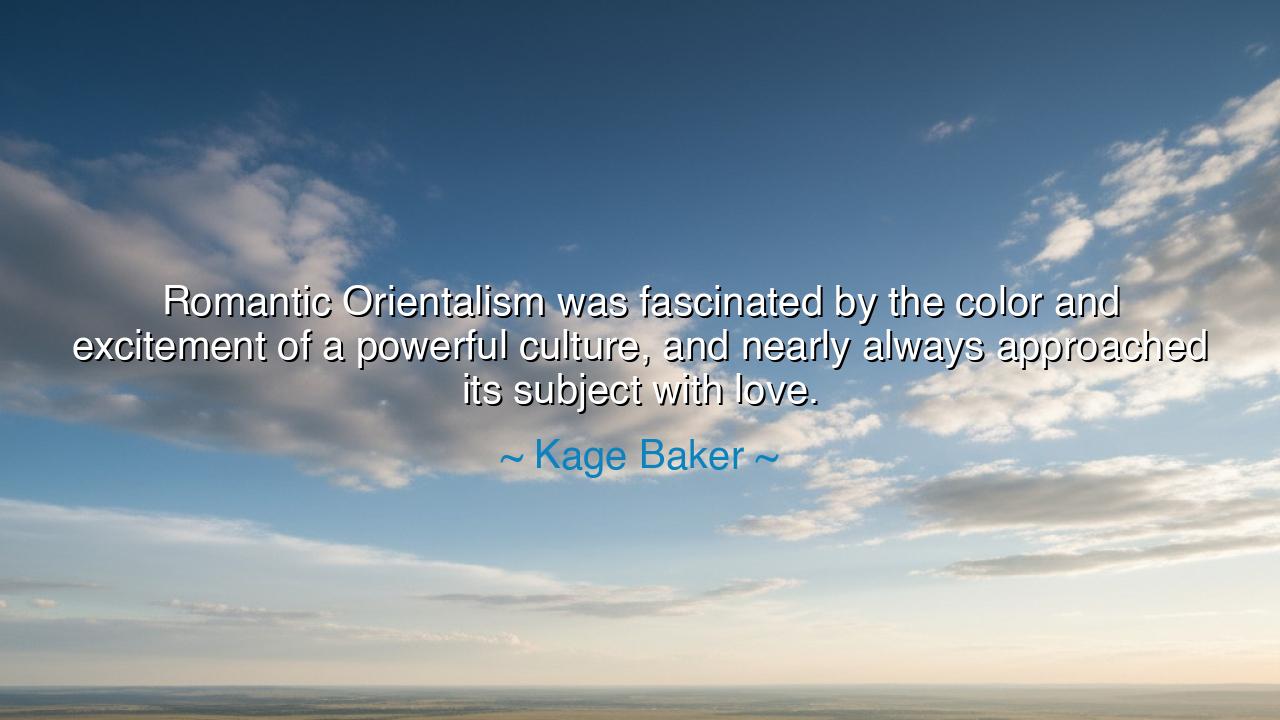
Romantic Orientalism was fascinated by the color and excitement
Romantic Orientalism was fascinated by the color and excitement of a powerful culture, and nearly always approached its subject with love.






Kage Baker, with the insight of one who studied both history and imagination, once observed: “Romantic Orientalism was fascinated by the color and excitement of a powerful culture, and nearly always approached its subject with love.” These words are not only a description of a literary movement, but also a meditation on the way one culture gazes upon another. For in them lies a truth that beauty, when seen from afar, inspires wonder and longing. The Romantics, weary of the industrial grayness of their own lands, looked eastward and found in the Orient a world of dazzling richness, mystery, and passion. They saw through the eyes not of conquerors, but of lovers.
The ancients too felt this pull of distant lands. The Greeks, when they encountered the splendor of Persia, were struck by its art and ceremony. Though they battled against it in war, their poets and historians could not help but describe its majesty with awe. Likewise, the Romans, though masters of conquest, filled their villas with silks, spices, and statues drawn from the East. Even in struggle, fascination endured, and color and excitement shone through the shadows of conflict. Baker’s words remind us that Romantic Orientalism belonged not to empire alone, but to yearning—the yearning for beauty beyond one’s familiar world.
Consider the poetry of Lord Byron, who traveled east and wrote of Greece, Turkey, and the Levant with passion and intensity. To him, these places were not cold objects of study, but living realms of adventure, sensuality, and myth. He approached them with the same fervor with which he approached love itself. In his words, one sees Baker’s point: that Romantic Orientalism, despite its distortions, was at heart driven by fascination and often by love. It was an attempt, however imperfect, to honor what was felt to be grand and stirring in the cultures of the East.
Yet we must not forget that love can sometimes blur truth. The Romantics, enchanted by palaces, bazaars, deserts, and harems, often imagined more than they truly understood. Their portraits of the Orient were colored as much by fantasy as by fact. They were filled with longing for mystery, but sometimes they missed the living reality of the people and places they described. This is the dual nature of Romantic Orientalism: both a tribute born of admiration and a distortion shaped by dreams.
History gives us other mirrors of this. When Marco Polo returned from his travels to the court of Kublai Khan, his descriptions filled Europe with wonder. Many doubted his tales, yet they were carried by the same spirit Baker describes: fascination with a powerful culture, told with reverence and excitement. The Orient, for him, was not merely distant—it was luminous, and he spoke of it with something that bordered on love. Here again we see how admiration for the unknown can kindle a fire in the human heart.
What, then, must we learn from Baker’s reflection? That to look upon another culture with admiration is noble, but it must be tempered with humility. To be fascinated by its color and excitement is a beginning, but not the end. True love seeks to understand, not merely to dream. The Romantics approached with passion, and in their longing they kept alive the truth that the East was not lesser, but magnificent. Yet we, inheritors of their gaze, must strive to go further—beyond fascination to respect, beyond imagination to truth.
So I say to you, seekers of wisdom: let your approach to other cultures, other peoples, be as the Romantics—filled with wonder, reverence, and love. But let it also be wiser: grounded in listening, in learning, in humility. Marvel at the color, be stirred by the excitement, but seek also the reality beneath the dream. For in this balance lies true honor: to celebrate not only the imagined glory of a people, but the living truth of their story. And in doing so, you will walk the path of both the romantic and the just.






AAdministratorAdministrator
Welcome, honored guests. Please leave a comment, we will respond soon